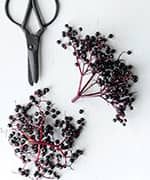Life Extension Magazine®
Colds and flu can make anyone miserable.
They pose a particular risk to older adults, who have reduced immune responses.1,2
Human studies show that three nutrients, taken in the early stages of a cold or flu, can activate immune functions to change the course of the illness.3-6
These nutrients can reduce duration and severity, making people feel better faster and decreasing the danger to older adults.
Protection Against Colds and Flu
Over one billion colds occur in the U.S. each year,7 typically lasting about seven days.8
Up to 20% of Americans contract the flu each year, which can lead to sometimes-fatal complications including pneumonia—particularly in older adults.7
Flu vaccines don’t protect against colds7 and don’t even protect against all the strains of flu virus.9
In human studies, scientists have demonstrated that elderberry, zinc, and vitamin C can help target respiratory infections:3-6
- Elderberry extract was shown to resolve upper respiratory symptoms up to four days earlier than a placebo,4,5
- Zinc lozenges were found to reduce duration of colds by up to 44% and severity of symptoms by as much as 50% when initiated soon after symptoms appear,3 and
- Vitamin C reduced duration of colds by 9.4% overall and by 18% in children.6
Supplementation should be started as soon as possible after symptoms begin.3,4,6,10 This strategy applies to all approaches including anti-viral flu drugs such as Xofluza® to get people back on their feet quickly.11
Elderberry
Elderberries contain anthocyanins, which are plant pigments that have demonstrated immunomodulating, antioxidant, antiviral, and anti-inflammatory effects.5,12,13
Elderberries’ antiviral effects have been shown in two major reports:
- A systematic review of previous studies published in 2021 found that elderberry extract may safely reduce the duration of flu and cold infections and reduce the severity of colds.5
- An earlier meta-analysis of clinical trials showed that elderberry extract can significantly reduce the duration of illness in people with flu or cold infections.12
Cell culture studies found that elderberry and its extract had direct antiviral effects against viral respiratory tract infections such as colds and flu.
In high (in vitro) doses, nearly 100% of cells were protected against infection.14,15 The positive outcomes were observed even in the virulent form of flu virus that caused the 1918 Spanish flu pandemic (H1N1). 15
Later studies demonstrated similar effects in humans. In one, people suffering from upper respiratory symptoms who used elderberry extract had their symptoms resolve four days earlier than those taking a placebo.4
Zinc
Zinc is critical to maintaining immune system strength. It helps with normal development and function of key immune components, including:16
- Natural killer cells, which kill virally infected cells and tumor cells,
- Lymphocytes, which produce antibodies and help control immune responses,
- Neutrophils, which travel to infection sites and ingest bacteria or viruses, and
- Macrophages, which surround and kill harmful microorganisms.
Zinc deficiency is common among the elderly.17,18 Data show that oral intake of zinc by the elderly boosts the stress response of white blood cells, enhancing immune response.19
Zinc also seems to coat the receptors that viruses use to bind to cells. This means that viruses may be kept out of body cells, effectively blocking them from replicating out of control.20
A meta-analysis of clinical trials evaluated the effects of taking more than 75 mg of zinc per day, in the form of zinc acetate lozenges every few hours throughout the day, starting after the first sign of symptoms. Results of this analysis showed:
- Reduced duration of various cold symptoms by between 18% to 54%, and
- Colds themselves were reduced in duration by 42%.
Vitamin C
Vitamin C enhances growth and survival of infection-fighting immune cells by:21-23
- Helping to increase levels of antibody-producing lymphocytes,
- Boosting function of infection-engulfing neutrophils, and
- Supporting natural killer cell activity.
Scientists have also demonstrated broader immune benefits of vitamin C, including:23,24
- Neutralization of excess free radicals caused by the immune system’s fight against infectious organisms,23
- Preclinically, increased interferons have been demonstrated; these are chemical signaling molecules the body produces to trigger immune mechanisms,23
- Support for production of collagen, the protein that helps respiratory and digestive tract linings maintain an anti-infection barrier,24 and
- Reduction of histamine, a pro-inflammatory compound that plays a role in infections and allergy symptoms.24
A large review paper on vitamin C and infections found that vitamin C reduced duration of colds by 9.4% on average (8% in adults, 18% in children).6
What you need to know
Strengthen Your Immune System—Fast
- Respiratory infections, such as colds and flu, have the potential to be life-threatening for aging people.
- Research has found that zinc, elderberry, and vitamin C help support the immune system and can reduce the severity and duration of colds and flu when taken at the first sign of symptoms.
- Zinc lozenges have been shown to reduce duration of colds by an average of 42%.
- Elderberry extract helps resolve upper respiratory symptoms up to four days earlier than a placebo.
- Vitamin C has been shown to reduce duration of colds by an average of 9.4% overall and by 18% in children.
Other studies have found that vitamin C reduces duration6,25,26 and incidence27-29 of colds. Some evidence has suggested greater benefit with higher doses and if intake begins right after symptom onset.8
The human body cannot produce or effectively store vitamin C. So, levels should be replenished daily.30
In an analysis of two clinical trials scientists found that a combination of 1,000 mg vitamin C plus 10 mg zinc over five days of treatment, was more efficient in reducing symptoms of cold than a placebo.31 This may indicate the importance of a multi-nutrient strategy.
Along with elderberry and zinc, vitamin C can provide important immune support.
Summary
Colds and flu can pose a substantial risk to older adults due to age-related immune decline.
Clinical studies demonstrate that, when taken for a short course at the first sign of symptoms, elderberry, zinc, and vitamin C can support the immune functions and reduce the severity and duration of certain viral infections.
If you have any questions on the scientific content of this article, please call a Life Extension Wellness Specialist at 1-866-864-3027.
References
- Fujihashi K, Kiyono H. Mucosal immunosenescence: new developments and vaccines to control infectious diseases. Trends Immunol. 2009 Jul;30(7):334-43.
- Montecino-Rodriguez E, Berent-Maoz B, Dorshkind K. Causes, consequences, and reversal of immune system aging. J Clin Invest. 2013 Mar;123(3):958-65.
- Hemila H, Chalker E. The effectiveness of high dose zinc acetate lozenges on various common cold symptoms: a meta-analysis. BMC Fam Pract. 2015 Feb 25;16:24.
- Zakay-Rones Z, Thom E, Wollan T, et al. Randomized study of the efficacy and safety of oral elderberry extract in the treatment of influenza A and B virus infections. J Int Med Res. 2004 Mar-Apr;32(2):132-40.
- Wieland LS, Piechotta V, Feinberg T, et al. Elderberry for prevention and treatment of viral respiratory illnesses: a systematic review. BMC Complement Med Ther. 2021 Apr 7;21(1):112.
- Hemila H. Vitamin C and Infections. Nutrients. 2017 Mar 29;9(4).
- Available at: https://www.nccih.nih.gov/health/flu-and-colds-in-depth#. Accessed October 17, 2022,
- Bucher A, White N. Vitamin C in the Prevention and Treatment of the Common Cold. Am J Lifestyle Med. 2016 May-Jun;10(3):181-3.
- Available at: https://www.cdc.gov/flu/weekly/index.htm. Accessed November, 9, 2022.
- Douglas RM, Chalker EB, Treacy B. Vitamin C for preventing and treating the common cold. Cochrane Database Syst Rev. 2000 (2):CD000980.
- Available at: https://www.cdc.gov/flu/treatment/whatyoushould.htm#:~:text=Studies%20show%20that%20flu%20antiviral,hospital%20with%20more%20severe%20illness. Accessed November 15, 2022.
- Hawkins J, Baker C, Cherry L, et al. Black elderberry (Sambucus nigra) supplementation effectively treats upper respiratory symptoms: A meta-analysis of randomized, controlled clinical trials. Complement Ther Med. 2019 Feb;42:361-5.
- Strugala P, Loi S, Bazanow B, et al. A Comprehensive Study on the Biological Activity of Elderberry Extract and Cyanidin 3-O-Glucoside and Their Interactions with Membranes and Human Serum Albumin. Molecules. 2018 Oct 8;23(10):2566.
- Roschek B, Jr., Fink RC, McMichael MD, et al. Elderberry flavonoids bind to and prevent H1N1 infection in vitro. Phytochemistry. 2009 Jul;70(10):1255-61.
- Available at: https://www.cdc.gov/flu/pandemic-resources/1918-commemoration/1918-pandemic-history.htm. Accessed 10/18/2022,
- Data on file.
- Barnett JB, Hamer DH, Meydani SN. Low zinc status: a new risk factor for pneumonia in the elderly? Nutr Rev. 2010 Jan;68(1):30-7.
- Available at: https://www.todaysgeriatricmedicine.com/news/ex_013113.shtml. Accessed September 30, 2022.
- Putics A, Vodros D, Malavolta M, et al. Zinc supplementation boosts the stress response in the elderly: Hsp70 status is linked to zinc availability in peripheral lymphocytes. Exp Gerontol. 2008 May;43(5):452-61.
- Hirt M, Nobel S, Barron E. Zinc nasal gel for the treatment of common cold symptoms: a double-blind, placebo-controlled trial. Ear Nose Throat J. 2000 Oct;79(10):778-80, 82.
- Huijskens MJ, Walczak M, Koller N, et al. Technical advance: ascorbic acid induces development of double-positive T cells from human hematopoietic stem cells in the absence of stromal cells. J Leukoc Biol. 2014 Dec;96(6):1165-75.
- Huijskens MJ, Walczak M, Sarkar S, et al. Ascorbic acid promotes proliferation of natural killer cell populations in culture systems applicable for natural killer cell therapy. Cytotherapy. 2015 May;17(5):613-20.
- Data on file.
- Carr AC, Maggini S. Vitamin C and Immune Function. Nutrients. 2017 Nov 3;9(11).
- Hemila H, Louhiala P. Vitamin C for preventing and treating pneumonia. Cochrane Database Syst Rev. 2013 Aug 8(8):CD005532.
- Ran L, Zhao W, Wang J, et al. Extra Dose of Vitamin C Based on a Daily Supplementation Shortens the Common Cold: A Meta-Analysis of 9 Randomized Controlled Trials. Biomed Res Int. 2018;2018:1837634.
- Van Straten M, Josling P. Preventing the common cold with a vitamin C supplement: a double-blind, placebo-controlled survey. Adv Ther. 2002 May-Jun;19(3):151-9.
- Sasazuki S, Sasaki S, Tsubono Y, et al. Effect of vitamin C on common cold: randomized controlled trial. Eur J Clin Nutr. 2006 Jan;60(1):9-17.
- Kim TK, Lim HR, Byun JS. Vitamin C supplementation reduces the odds of developing a common cold in Republic of Korea Army recruits: randomised controlled trial. BMJ Mil Health. 2022 Apr;168(2):117-23.
- Available at: https://ods.od.nih.gov/factsheets/VitaminC-HealthProfessional/. Accessed November 11, 2022.
- Maggini S, Beveridge S, Suter M. A combination of high-dose vitamin C plus zinc for the common cold. J Int Med Res. 2012;40(1):28-42.





